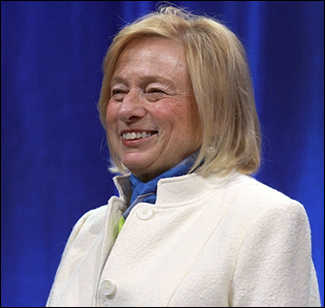By Jim Ellis — Wednesday, Oct. 15, 2025
Senate
Maine Gov. Janet Mills (D), after a premature social media Senate announcement message over the weekend was pulled back, yesterday formally declared her intention to challenge veteran Sen. Susan Collins (R). The Governor was Senate Minority Leader Chuck Schumer’s top choice to challenge Sen. Collins who overcame a massive attack campaign in 2020 to secure a fifth term.Sen. Collins was first elected in 1996 and has announced plans to run again for a sixth term next year. Gov. Mills was elected in 2018, re-elected four years later, and is ineligible to seek a third term under the state’s election system.
In 2020, the Democrats and their candidate, then-state House Speaker Sara Gideon, spent over $60 million against Sen. Collins in a state of just over a million people. In fact, Gideon had so much money that her campaign coffers still possessed more than $9 million after the election. Under criticism from Democrats because she had so much money left over, the party nominee explained “there was simply nothing left to buy” as hundreds of thousands of dollars flowed into her campaign coffers from all over the country during the 2020 campaign’s last week.
Though every poll but one showed Gideon winning, Sen. Collins went on to score what had to be considered an upset win despite her long-term incumbency with a 50-42 percent victory margin.
Gov. Mills averaged 53.3 percent of the vote in her two victorious gubernatorial elections, which includes her 55.7 – 42.4 percent re-election victory over former two-term Republican Governor Paul LePage. The ex-state chief executive is now running for the US House in the state’s northern district. Before serving as Governor, Mills was a state legislative-appointed Attorney General, a state legislator, and a former local county district attorney.
While Sen. Collins’ age (she will be 73 at the time of the next election) might be an issue in other states as candidates prepare for the 2026 midterm elections, it will not be a factor in the Maine Senate race. Gov. Mills herself will be 78 years old at the time of the November 2026 election.
Gov. Mills began her campaign with the typical attacks levied against Republicans, saying they are cutting Medicaid so the wealthiest can have tax breaks, and “threatening democracy.” The Governor, however, is saddled with at least two major negatives of her own that will be front and center in the Collins campaign arsenal, added to a national GOP attack theme.
As we remember, Gov. Mills attracted national attention by defying President Trump over the “men in women’s sports” issue. Even in Maine, the Mills position favoring transgenders participating in women’s sports polls negatively. She also promoted an energy transmission issue that her opponents said favored Massachusetts to Maine’s detriment. The associated ballot initiative she supported was subsequently soundly defeated.
Today, Maine’s political campaigns are clearly defined. The state has two congressional districts, which are politically opposite. The southern 1st District that includes the state’s largest metropolitan area of Portland, is heavily Democratic. The northern 2nd District, which begins in the Lewiston-Auburn area and moves all the way to Canada, features the most Republican electorate in the country that sends a Democrat to the House.
Statewide, Democrats win by securing a larger majority in the 1st District than Republicans record in the 2nd. Sen. Collins habitually wins by running up her positive vote total in the 2nd District and reducing her margin of defeat in the 1st. As the political polarization grows nationally and in Maine, the 1st becomes more Democratic and the 2nd more Republican.
With former Gov. LePage running unopposed for the GOP congressional nomination in District 2, thus uniting the party behind his candidacy, Republican turnout in the general election could be spurred.
In LePage’s three gubernatorial elections, including his landslide loss to Mills, he carried the 2nd District, and he currently is the most prolific fundraiser among all Republican congressional challengers. His race against four-term Rep. Jared Golden (D-Lewiston) promises to be close and could arguably be the Republicans’ best national US House conversion opportunity.
While the Democrats are successful in recruiting their top Maine Senate prospect, we can expect another brutal campaign to begin in the Pine Tree State. Heading into the election year, the Maine Senate campaign must be rated as a toss-up. Expect the polling to favor Mills, as it consistently favored the Democratic nominee in 2020, but history shows that the Republican turnout typically well exceeds projected polling results.


